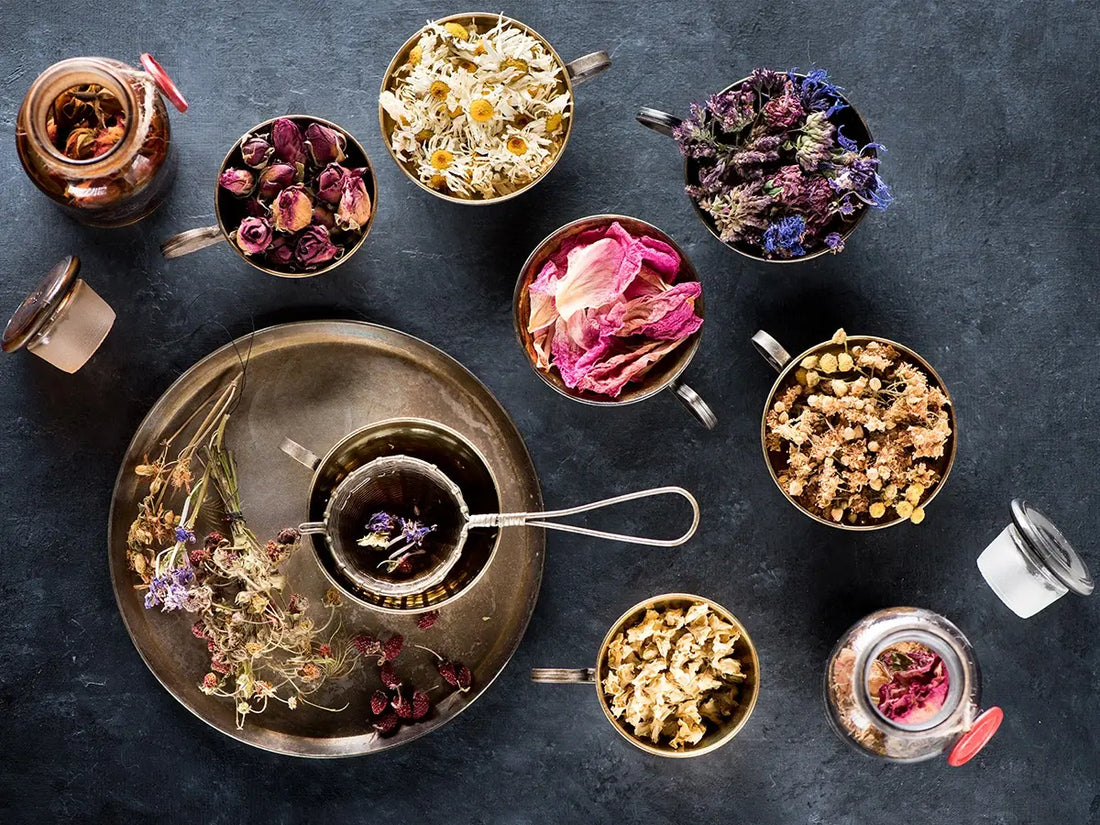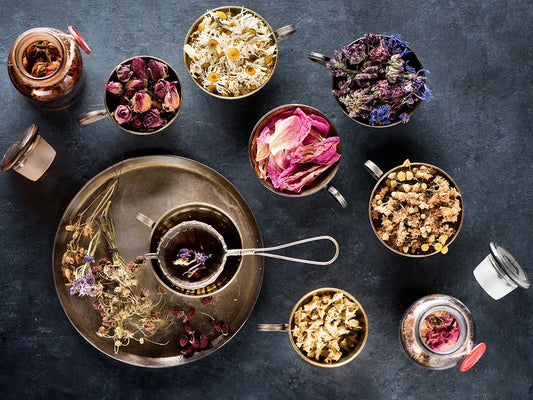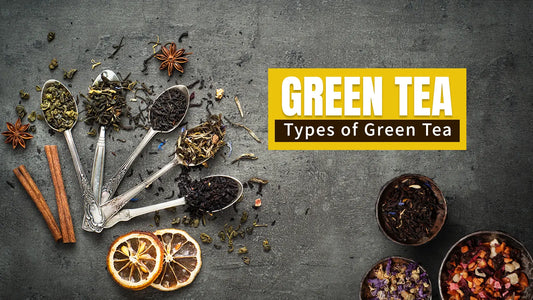Herbal Teas: Everything You Need to Know About Herbal Tea

While orthodox teas are loved for their rich flavors, the caffeine content might sometimes lead to unwanted jittery feeling, especially for caffeine-sensitive people.
If you’re looking for a soothing and relaxing alternative, caffeine-free herbal teas aka tisanes, might be a perfect match for you. This delightful tea is made by infusing a variety of herbs, offering numerous potential health benefits.
What is herbal tea?
Herbal tea is a beverage made by the decoction of dried or fresh herbs. It involves steeping several parts of herbs like leaves, flowers, seeds, or roots into hot water.
So, it’s not really a tea like the true tea that comes from the Camellia Sinensis plant.
Since herbal tea is naturally caffeine-free, it could be a good alternative for someone who is caffeine intolerant. However, note that herbal teas that are blended with orthodox teas contain some level of caffeine.
Types of Herbal Teas
Peppermint Tea
Peppermint tea is one of the refreshing teas enjoyed for its cooling and refreshing flavor. This beverage is prepared by infusing the peppermint leaves. Due to the presence of menthol, peppermint tea gives off a minty aroma and a spicy taste.
Spearmint Tea
In case peppermint tea is spicy for you, spearmint tea has a more subtle and lighter flavor profile. This tea consists of spearmint leaves, having a delicately sweet and minty taste. It’s also widely consumed for its refreshing effect and potential health benefits.
You could try our premium Himalayas loose-leaf spearmint tea from Danfe Tea, produced with organic spearmint and black tea leaves.
Chamomile Tea
Chamomile tea is an herbal tea made from the dried chamomile flower. It usually has a mild and soothing flavor with subtle floral notes. If you want to try, you could look for Egyptian chamomile, German chamomile, Roman chamomile, etc.
Lavender Tea
Lavender tea is composed of dried or fresh lavender buds. This herbal tea has a sweet and floral taste profile with a smoky flavor. People appreciate this beverage for its relaxing, calming, and soothing effect.
Holy Basil Tea
Holy basil tea is the composition of dried or fresh holy basil leaves, offering a peppery and kind of sweet taste. Compared to other herbal teas, this beverage has abundant nutrients like minerals and vitamins. So, it could also provide you with medicinal benefits.
If you’d like to try holy basil tea, we have two finest teas from the Himalayas at Danfe Tea: Sacred Basil Tea and Tulsi Basil Tea.
Ginger Tea
Ginger, classified as a herb and spice, has been used for medicinal purposes for many years. You may also find the ginger in masala chai.
But, ginger herbal tea is prepared by steeping the dried or fresh ginger in boiling water. This tea has a strong flavor with a spicy taste.
Hibiscus Tea
Hibiscus tea, made with red calyces of the hibiscus plant gives off a fruity cranberry-like and tart flavor. This herbal tea has a fresh and fruity aroma with floral undertones.
Moringa Tea
Moringa herbal tea is prepared by infusing the moringa tree leaves into hot water. It has an earthy, nutty, slightly sweet, and mild flavor.
Lemongrass Tea
Lemongrass tea is another herbal tea that consists of leaves and stalks of lemongrass plant. This beverage offers a citrusy aroma and flavor with a slightly grassy taste.
Our Danfe Tea’s loose-leaf lemongrass tea has an incredibly zesting and refreshing taste with a ginger note.

How to make herbal tea?
Herbal teas are one of the simplest teas to prepare. You just need a high-quality herbal tea and infuse it into the hot water. For high-quality and caffeine-free herbal teas, here are some of the popular brands you can choose from: Pukka herbal tea, Danfe Tea, Jia Duo Bao herbal tea, etc.
To get the best flavor, try maintaining the water temperature and steeping time as per the herbal tea you use. But don’t get overwhelmed! There’s no hard and fast rule for brewing tea, including herbal teas.
In fact, we strongly encourage you to try and test your own recipes. You may also add your preferred ingredients to enhance the flavor and medicinal effects of herbal tea.
You’ll Need:
- 1 teaspoon of herbal tea
- 12 fl oz of filtered water
- A kettle or saucepan
- A teacup
- Strainer
- Sweeteners like honey or sugar (optional)
- Lemon, ginger, or any other flavorings
Instructions:
- Boil the water in a kettle or saucepan.
- Add 1 teaspoon of herbal tea to the boiling water. Then, put your preferred ingredients or flavors.
- For delicate herbal teas like chamomile, you may infuse for around 3 to 5 minutes. Similarly, you may steep intense herbal teas like ginger tea for 10 minutes.
- Now, take the strainer and pour the herbal tea into your cup.
Benefits of Herbal Teas
Each herbal tea has its own distinct nutritional properties that might offer numerous potential health benefits. For instance, peppermint tea could help with bloating, while chamomile tea could help in improving sleep quality.
Now, let us unfold how incorporating herbal teas into your daily life could be a healthier option compared to other teas.
Disclaimer: While herbal teas could have potential advantages to your health, they could have side effects too. If you’re consuming it for medication or remedies, we advise you to look for its side effects, or allergies, or consult healthcare professionals.
May Relieve Constipation
Some herbal teas could contain high fiber content, and anti-inflammatory, or antispasmodic properties. Due to this, drinking herbal teas might help to relieve constipation through laxative effects, enhancing gut health, and stimulating the digestive system.
Might Help with Menstrual Pain
Did you know that herbal teas could potentially relieve menstrual pain?
Due to the anti-inflammatory effect of chamomile tea, consuming this tea could help to relax the uterus muscles, potentially lowering menstrual pain. Similarly, people traditionally drank herbal teas like raspberry leaf tea as a natural home remedy to ease uterine cramps.
May Maintain Hormone
Herbal tea like spearmint tea might help to maintain hormones, especially in women. As per a study, drinking spearmint tea could lower hirsutism and testosterone levels in PCOS-diagnosed women.
Might Soothe Digestive Issues
Since anti-inflammatory and antispasmodic properties are naturally present in herbal teas, it could help to relieve the symptoms of digestive issues. Drinking herbal tea may soothe stomach upset, bloating, cramps, gastrointestinal function, inflammation, and more.
Could Help with Stress
Herbal teas might help in decreasing the cortisol that’s the stress hormone. Consuming herbal teas could provide a calming and soothing effect, promoting relaxation.
Herbal Teas vs. Traditional Loose-Leaf Teas
Herbal teas are purely made of dried or fresh herbs, leaves, roots, etc. So, it’s completely caffeine-free. You can find herbal teas in packaged bags or loose leaves. Some examples are chamomile tea, spearmint tea, lemongrass tea, etc
On the other hand, traditional loose leaf teas come from Camellia Sinensis. These teas are naturally caffeinated and processed on different levels. It’s examples are white tea, green tea, matcha, black tea, and chai tea.

Herbal Tea FAQs
Does herbal tea expire?
Technically, herbal teas might not expire like the orthodox teas. Still, these teas could degrade over time and usually have a shelf life of 18 to 24 months if stored correctly. However, we advise you to look into the packaging to know the expiry date.
Does herbal tea have calories?
Yes, herbal tea contains calories. But, when you brew this tea with just herbs and water, it has very little calories.
Does herbal tea stain teeth?
Yes, drinking herbal teas could possibly stain your teeth. Herbal teas consist of tannins which are responsible for discoloration. While some herbal teas like hibiscus could have stronger effects, other teas like chamomile might have less effect.
Is chai tea herbal?
Chai tea is technically not an herbal tea as it is commonly brewed with black tea. But, if you use herbal tea leaves with spices to prepare it, it could be herbal chai.
How long does it take to steep herbal tea?
Usually, the steeping time for herbal tea ranges from 5 to 7 minutes. But, it really depends on what type of tea you’re using and your preference.
Is herbal tea caffeine free?
Yes, all herbal teas, except for the yerba mate, are caffeine free.
Does herbal tea go bad?
Yes, herbal teas can go bad, especially when you do not store them properly. The herbal teas could lose their aroma and flavor, have mold, smell musty, discolor, etc.
Is herbal tea hydrating?
Since herbal teas are caffeine free and make the beverage tastier than plain water, it could have a hydrating effect. Some herbs that contain natural diuretics could also help in lowering the water retention.
Is green tea herbal tea?
No, green tea is not herbal tea. In fact, green teas are a kind of orthodox tea that’s derived from the Camellia Sinensis plant and contains caffeine.
Does herbal tea break a fast?
When consumed without any extra ingredients, herbal teas do not break fast. It is a flavored beverage with just herb leaves and is suitable to drink during fasting.

Conclusion
Whether you’re seeking to enhance a healthier lifestyle or simply enjoy a calming cup, herbal teas provide a flavorful escape without the caffeine buzz.
If you want to savor the finest loose leaf herbal teas from the Himalayas, we invite you to check out Danfe Tea’s exclusive collection of herbal teas: lemongrass tea, sacred basil tea, tulsi basil tea, and spearmint tea. Try them today and share your experience with us!








